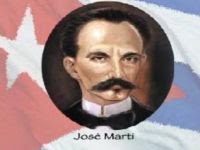Born 160 years ago, the great martyr of Cuban Independence, José Martí
The ideals of Martí, along with Marxism-Leninism, are the guiding policies of Cuba today... Monday, January 28, 2013, commemorated the 160th anniversary of the birth of the intellectual mentor of the Cuban revolution, José Julián Martí Pérez (Havana, Cuba, January 28, 1853 - May 19, 1895, Dos Rios, Cuba).

The son of a Spanish father and a mother who was a native of the Canary Islands, José Martí is considered an apostle and martyr of the great Cuban independence from Spain. Besides being a prolific poet and thinker since his youth, he demonstrated civic concern and sympathy for the revolutionary ideas that gestated among Cubans.
Influenced by the independence ideas of Rafael Maria de Mendive, his teacher in high school in Havana, he began his political involvement with writing and distributing newspapers with separatist content early in the Ten Years' War. With the arrest and deportation of his teacher, Mendive, the attitude of rebellion crystallized that Martí harbored against Spanish domination.
In 1869, at just 16 years of age, he published a printed separatist paper, El Diablo Cojuelo, and the first and only issue of the journal, La Patria Libre. In the same year, he began distributing a journal written by hand, entitled, El Siboney. Shortly after, he was arrested and prosecuted by the Spanish government for being in possession of material considered revolutionary. He was sentenced to six years of hard labor, but spent only six months in prison until, in 1871, in failing health, his family got him a reprieve and he got to swap the original penalty for deportation to Spain.
In Spain, Martí published in that same year, his first important work, "El Presidio Political en Cuba," which exposes the cruelties and horrors in the period when he was in prison in Cuba.
In this work, he would already present the idealism and vigorous style that would make Martí known in intellectual circles of his day. Later, he devoted himself to the study of law, obtaining his doctorate in Law, Philosophy and Literature at the University of Zaragoza in 1874.
On May 19, 1895, in command of a small contingent of Cuban patriots, after an unexpected encounter with Spanish troops near the village of Dos Ríos, José Martí was hit and then died. His body, mutilated by Spanish soldiers, was exhibited to the public and subsequently buried in the city of Santiago de Cuba, on May 27th of the same year.
For Martí, the fight should be a true Cuban transformation in all aspects: economic, political and social. The ideals of Martí, along with Marxism-Leninism, are the guiding policies of Cuba today.
Source: Brazil Fact (Brasil de Fato)
Translated from the Portuguese version by:
Lisa Karpova
Pravda.Ru
Subscribe to Pravda.Ru Telegram channel, Facebook, RSS!


